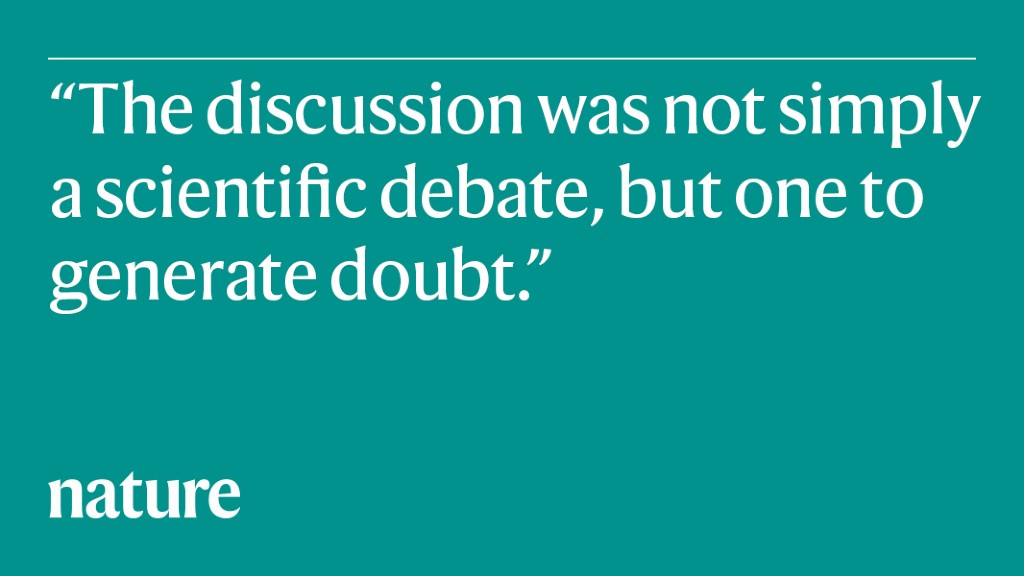
Researchers at the COP26 climate talks this month know well how doubt can be weaponized to delay action — something many COVID-19 scientists have taken too long to appreciate. They point out problematic methods, poor study design and unjustified claims, but their efforts would be much more effective if they first considered a larger strategy: how ‘sciency-ness’ is used to distract from reality and hinder effective policy.
Much of my own work focuses on how industry exploits scientific credentials to bolster false claims that undermine breastfeeding to increase sales of formula milk and, ultimately, damage health. The strategies and patterns recur across industries: they have been documented in tobacco, fossil fuels, pharmaceuticals, food and more. This influence is so powerful that public-health researchers consider it a distinct area of study: ‘commercial determinants of health’.
Throughout the pandemic, I’ve been saddened at how science has been hijacked. Arguments around herd immunity exemplify this: proponents claimed that acquiring immunity by infection was fine for most people and also that communities were well on their way to achieving herd immunity. The messages downplayed dangers for those with high risks of exposure or severe illness. Technical arguments over infection rates silently cemented the assumption that disabled or immunocompromised people did not merit collective protective action; nor did the workers whose jobs required dangerous public contact.
Although many scientific champions did provide appropriate context, I watched several respected colleagues step into debates on when, or if, society would reach herd immunity without realizing that the discussion was not simply a scientific debate. Their too-narrow focus unintentionally helped to promote controversy and doubt, and that ultimately impeded an effective public-health response. The same happened around mask use, vaccination and school policies. This helped to shift public opinion on which public-health measures were ‘acceptable’: the fewer the better.
The field of agnotology (the study of deliberate spreading of confusion) shows how ignorance and doubt can be purposefully manufactured. Famous scholars include David Michaels, Marion Nestle and Naomi Oreskes. In September, Katharine Hayhoe, chief scientist at the Nature Conservancy, a non-profit organization based in Arlington, Virginia, quoted environmentalist Bill McKibben on Twitter in regard to climate change: “We spent a long time thinking we were engaged in an argument about data and reason …. But now we realize it’s a fight over money and power.” Hayhoe elaborated: “‘Objections’ were always, entirely, professionally, and verrrry cleverly couched in scientific terms. They [industry] focused their lasers on the science and like cats we followed their pointer and their lead.” Some elements of manufactured doubt in this pandemic might seem fuzzier, especially when vested interests are not always clear. Nonetheless, the same lessons apply.
How can researchers keep from being distracted like cats? By gaining a better understanding of how strategies are deployed to manufacture doubt and ignorance.
First, researchers must learn to identify authors of research, and their relationships with industry and with non-profit groups that have specialized agendas. How the tobacco industry paid scientists and physicians to serve as advisers and consultants to undermine the body of evidence pointing to the harms of tobacco is extensively documented. More recent examples abound. For instance, the non-profit International Life Sciences Institute, based in Washington DC and funded by leading companies in the food and chemical industries, promotes doubt about science that links ultraprocessed foods with health concerns, and provides experts to promote personal responsibility rather than regulations on junk food in policies to combat obesity.
Second, scientists should consider what kinds of argument the data and conclusions serve. How might these shape public opinion? What policy decisions might they affect? A review of corporate determinants of health highlights how media ownership can shape coverage and frame whether health is seen as a matter of ‘personal responsibility’, which suits corporate interests, or a communal and governmental responsibility (M. McKee and D. Stuckler Am. J. Public Health 108, 1167–1170; 2018). This has a key role in whether individual decisions are cast as a matter of ‘freedom’ versus ‘solidarity’, and regulations as restriction or protection. Scientists can point out these framings when talking to reporters or on social media.
Third, scientists can consistently highlight correct information and avoid serving as inadvertent amplifiers of flawed information; they can encourage journalists to do the same. Avoid links to news articles or commentaries that highlight poor studies or otherwise use science irresponsibly. Provoking outrage and controversy helps misleading arguments to spread, which serves to manufacture doubt. And, as documented in anti-vaccine movements and climate denial, controversy around one article can generate attention that legitimizes problematic arguments.
The scientists who gum up the doubt machine do so by constantly pointing to the broader context, by acknowledging genuine scientific debate, by being alert to researchers’ political and commercial connections, and by staying educated on how denialism works. If more scientists did the same, these distorting strategies would be stymied.
"machine" - Google News
November 02, 2021 at 05:50PM
https://ift.tt/3mJz1KV
Scientists: don't feed the doubt machine - Nature.com
"machine" - Google News
https://ift.tt/2VUJ7uS
https://ift.tt/2SvsFPt
Bagikan Berita Ini














0 Response to "Scientists: don't feed the doubt machine - Nature.com"
Post a Comment